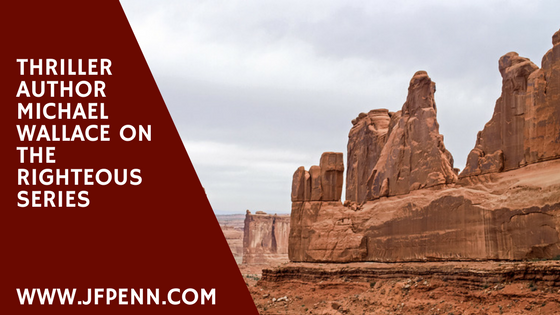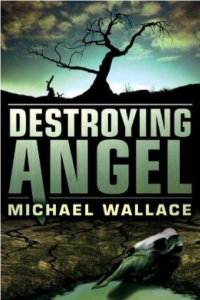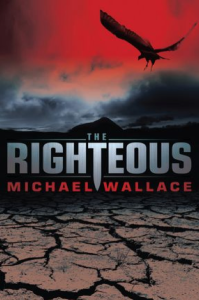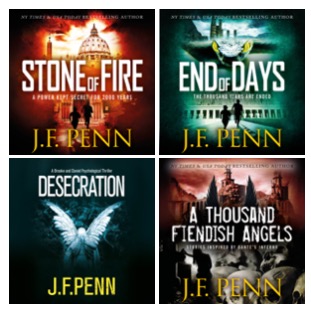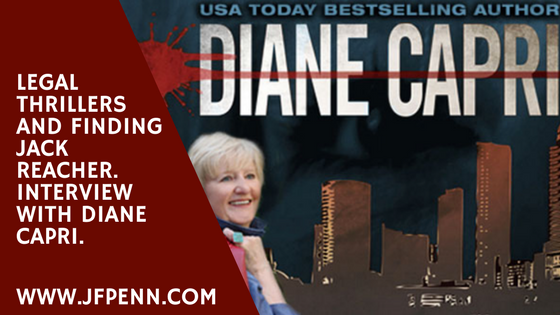
Joanna: Welcome Diane, please start off by telling us a bit more about you and your writing background.
“I think that life is a mystery”
Diane: Well, I write legal thrillers, primarily, with a heavy element of mystery, because I think life is a mystery, and that’s one of the reasons that I read and one of the reasons I write, and why I’m still here, you know, to find out what happens. So, we’re heavy on the mystery and thriller and suspense in my series.
Most recently I’ve been writing some stuff on the hunt for Jack Reacher. It’s a frightening project, because Jack Reacher has tons and tons of fans, and some of them are happy with me, and some are not. But it’s a lot of fun: I really enjoy it.
And then I write a series set in Florida, involving Judge Willa Carson, and that’s really lots of fun. If you like, say, Travis McGee and those kinds of stories where you’ve got an unusual, idyllic lifestyle and also a little mystery thrown in, you’ll like that.
And then I have started a new series: my protagonist is Jess Kimball and her mission in life is to hunt down the guy who stole her child.
So you were a lawyer. How much of that is woven into all of your books?
Diane: Oh – well, a lot. All of my books have lawyers in them, they all come from me, because I draw on my 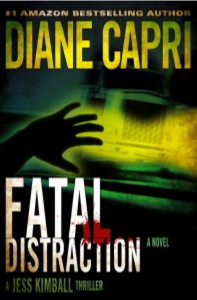
You’re obviously very focused on justice, but what are some of the other themes that come up in your writing over and over again?
Diane: Well, I think – and it’s kind of related to justice in the broader sense, not the legal sense – but I write a lot about trust and betrayal. And that really is what justice is, in society. You know, when we trust someone and they betray us, and you feel unjustly treated, and you want justice.
And then the other thing is, I just like to kind of write things. And it’s really fun for me to do research for these books, and I like to share what I’ve learnt. It’s one of the reasons why I was attracted to the Lee Child Reacher books initially: they’re just full of little arcane facts that you would never know, like the perfect shape of a button cuff, for example. And I think that’s fun, and that’s the stuff that attracts me. If it’s unusual or clever or different and I didn’t know about it, it’s like “Wow, hey, did you know that?” and that’s how I usually end up with it.
Joanna: I’m the same: I love finding out little things. And if I don’t learn something from someone else’s book, I get very annoyed! Coming back to the Jack Reacher series, obviously Jack Reacher books are kind of archetypal masculine hardness, and you obviously write kick-ass female protagonists.
How do you balance the gender issues between the Reacher series and your own writing?
Diane: Well, you know, there’s no question that the Hunting Reacher series of books are, like you say, harder than my Justice series, and I guess the Jess Kimball books are kind of in the middle of that. And it is a different perspective for me: you’re absolutely right.
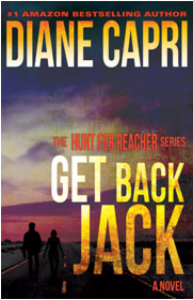
The way Reacher is, it’s part cerebral and it’s part that he's just so huge. So he can just roll in there and wipe the floor with the bad guys, and he’s done, you know. My girl, she obviously can’t do that! So she has to be more clever, and it would be interesting to think one day they could eventually square up what happened there. Now, fans tell me all the time there would be no contest between them, but just let’s wait and see.
Joanna: Yeah! I’m keen to see that, too, actually.
Tell us a bit more about Get Back Jack, and what people can expect in that book.
Diane: Get Back Jack is my newest book in the Hunt for Reacher series. It’s the second novel. There was a novel called Don’t Know Jack, and then two shorter books, and there’s now the second novel. So, now we have our FBI agents, Otto and Gaspar, still hunting for Reacher, and by the way, this is the Hunt for Reacher series. Some people think Reacher’s going to be the main character, and he isn’t. They’re looking for him. So we’re kind of going where he’s already been.
We always have a launch book, and the Lee Child book that we’re launching from this time is his book called ‘Bad Luck and Trouble‘. And that was a story where Reacher got involved with his old army buddies, and they got into a whole bunch of trouble, and Reacher made some mistakes. I know we think Reacher never makes any mistakes, but I’m telling you he does. And so Kim and Gaspar go behind that, and they also get into a whole lot of trouble, because Jack didn’t take care of business first time round.
Joanna: Obviously, I’m a Reacher fan, and I really like this idea. Just coming back to your research process: when you’re researching these books, is it primarily delving into the source book, as such.
Do you do any other research on scene, or do you go visit places?
Diane: Sure. You know, I really never write about somewhere that I’ve never been physically, because I bring my own inner perspective to it. Everybody, I’m sure, has had this experience, it’s different to go to a concert and watching it on TV. Or even going to one of those movie theaters where they show the concert on the screen: that’s still different in feel from being in a place. So I never write about a place I haven’t been.
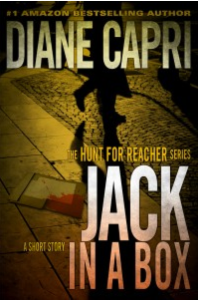
Joanna: Yes, it’s important to do a lot of sacrificial travel!
Diane: But as far as research goes, it’s very challenging to stay true to the Reacher world, and yet add something new to the mix. So that’s where the intersection is, for me, and that’s where I have to spend the most time. So, I need to be true to what happened before, but I am writing a new story, so it has to flow from that, but it has to add a new element as well.
So, you know, Kim sees the world differently than Reacher does. I mean, they’re both cops in a way. He’s sort of gone over to the dark side, and she’s tried not to, so they see the world differently, and that is a challenge. It’s fun, I like it.
Joanna: Talking about writing and a sense of place, you write a lot about Florida.
What does Florida mean to you, personally?
Diane: To me, Florida’s a state of mind, really. I mean, I love it here, and right now, I especially love it, because it is freezing cold everywhere north of me! Right now, it’s really perfect here. I like to live where it’s perpetually summer. So that’s what Florida is to me: it’s all the summers in my mind, and I try to be there as much as I can.
Joanna: And you bring that kind of feeling into the books?
Diane: I really try to. You know, a lot of people, people who live here, even, will say, “Wow, I didn’t think about that”, or “That sounds like fun”. You know, if you live in a place, you sort of don’t see it anymore. It just becomes home; you’re not really noticing the things that strangers will notice.
Joanna: I haven’t been to Florida. I’ve been to other places in the States, but not Florida. Maybe one day!
Diane: Well, you should come here, and I can buy you some café con lecce, which is fabulous, and you will enjoy it, it’s very fun. I mean, it gets a bit chilly where you are, sometimes.
Joanna: It is. I’m freezing in London right now. Just a question, and I ask this of all the people I talk to on this thriller series: we write these exciting characters who have fights, and explode things, and shoot. How exciting are you in comparison?
Tell us some thrilling things about you, Diane!
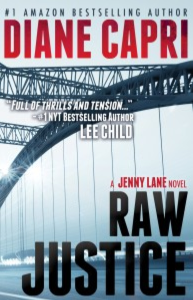
Like a lot of writers, I’m very much an observer. I’m a little bit adventurous, but I don’t love danger. I’m not afraid of things, people say that when you write thrillers or noir, you’re really exploring what you’re frightened of. So it’s kind of a challenge for me, because I’m not afraid of a lot of things, like I’m not afraid of heights, and I go up in hot air balloons, and helicopters and things like that. But my life in general, I try to keep it quiet.
Joanna: Keep the drama on the page! That’s great. And then what about your writing life?
Do you have a special writing space?
Diane: Oh, I do, and we’re there right now. I guess it’s like a den. For me, it’s an office in my home, and I have a desk and a computer, and that’s about it. I have a couple of photographs on the wall that were taken – not by me – in Venice during the Carnival. And what I like about them is that they’re very inspiring for a writer, because they give you the impression that there are a lot of people out there, and they all have shadows, you know: there’s all kinds of things you can’t see, stuff going on that you don't know, and that’s where I like to put my books. When I read, I like that, I like there to be something behind the words that I didn’t catch. So, you look up and you see these pictures and you think, “OK, there’s something that you can’t see: what is that thing?” and that’s what I like.
Joanna: I’m a very visual person as well: I love images. Do you get a lot of ideas from physical images or seeing things, or do you read stuff?
How do you get those ideas?
Diane: You know, I think that’s magic, don’t you? I mean, I don’t really know the answer to that. What I have a tendency to do is to take in a lot of stuff in a variety of ways. I think writers are like sponges. You know, think of a sponge, and then maybe you spill some milk, and then maybe spill some red wine, and you’re wiping it up with the sponge, and then when you squeeze the sponge out, it’s going to be totally different, right?
Joanna: And much nicer in a book than in that metaphor!
Diane: Right! So, I travel a lot, I read a lot, I watch a lot of films. I meet people and talk to people about their lives. I think people are pretty fascinating – you know, there’s that catchphrase on one of the TV shows, I think it’s called Biography, where they say, “Every life tells a story”. Well, I think everyone tells a million stories, and if you talk to people about different experiences they’ve had, even though they’ll say, “Oh, I’m not interesting”, you know, if you chat for five minutes, you find out a whole lot of things.
Joanna: Yes. And you mentioned reading different books there.
Who are your favorite thriller authors to read?
Diane: I have a list that’s endless.
Joanna: You can just pick a couple!
Diane: I read everybody. And do that, obviously because I like it, but also because I want to see what’s out there in the world. I don’t want to do something that everybody else is doing: I want my stuff to be different. So you have to stay aware of what’s going on in your genre. And I also read writing outside the genre.
But out of writing by others, my favorites are Lee Child, and Michael Connolly is a favorite. I like James Rollins. I have kind of a love-hate relationship with John Grisham, sometimes I like him, except when he’s beating me on the bestseller list, then I don’t! I enjoy some of James Patterson’s work, some of them are not for me, some are in other genres. I love Jeffrey Deaver. They all do really, really well, and they all write books that are really exciting.
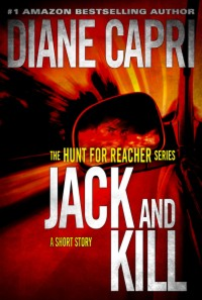
Joanna: Yes, a long list! I’m interested, then, because a couple of the names on your list could be considered more crime authors. I feel that I write thriller/crime/horror.
Do you feel that there’s any real distinction between genres, or are we blurring the lines now?
Diane: Well, I think we are blurring the lines. I think the lines have been blurred for a while. You know, for a long time I resisted the idea that I would write thrillers, because to me that was wrong, and I wasn’t sort of in that box. I don’t like that. Or supernatural, or whatever they call it – paranormal. It’s not that I don’t like that stuff, but I don’t write any of that. So, to me, that’s where the thrillers go. And crime fiction was something else. And when it started out, it was called Mystery, regardless of what it was, and then they broadened it to crime fiction.
So I think it’s really all blended together. I think it’s very hard to kind of draw those distinctions now. So I don’t know – that’s a very interesting question.
Joanna: It is interesting. Following on from that, and with your legal background, one of the biggest kind of attacks that we get, I think, as thriller writers, and particularly as women, is,
“You’re writing too much violence: why don’t you write something more edifying for humanity?” What do you say to that?
Diane: Well, you know, we do hear that. I think the kind of work that I do, and I enjoy reading, is sort of a modern morality play.
And we really are sort of demonstrating – hopefully in an entertaining and exciting way, because if we’re not entertaining and exciting you might as well watch the news on TV – how to behave and how not to behave.
So, one way you don’t behave in life is you don’t betray people who trust you. You don’t take advantage of people who are weaker than you are. You don’t hurt others intentionally. And in most of our books, unless they have, I guess, a Jack Reacher, in most of our books, what we do is to highlight that, and to say, you know, “OK, if you do those things, you’re the bad guys, and if you’re trying to bring those people to justice” – because my books are always about justice – “then you’re on the good side”.
And I think that kind of moral instruction, if done well, in an entertaining environment, is really kind of what we’re doing here. I think in an earlier age, this same role was played by Dickens, for example. That’s what he wrote: all the misery out there, you know, don’t be Scrooge, try to be Tim Cratchit instead. In general, I think that’s what we write.
Joanna: I agree, and I think as long as we come down on the side of the angels, and our books have that message, and good always wins, which, let’s face it, with most thriller writers, good always wins, then that’s cool.
Diane: Well, unless it’s in the middle of a series and you’ve got to come back to the next book!
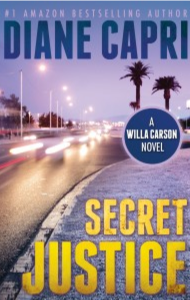
What are you working on next?
Diane: Oh, my gosh! See, this is always a secret, because I’ve promised my readers that I will tell them first. So, what I can say right now is that I’ve got a novella and two novels in the pipeline that I’m working on. I’m a slow writer. I know lots of people are faster than me, but I’m just not. I try to be faster, but really I’m just not. So it takes me a while.
Coming soon, I hope, in early 2014, is a German translation. Lots of German readers enjoy their crime fiction, so that’ll be good fun.
Joanna: Thanks ever so much for your time, Diane, that was great.
Diane: Thank you, Joanna, I really enjoyed it.
You can find Diane and her books at DianeCapri.com and on twitter @dianecapri
Her latest book is ‘Get Back Jack,' available now.
